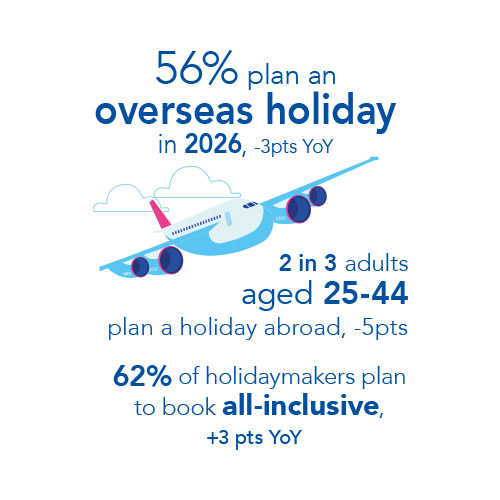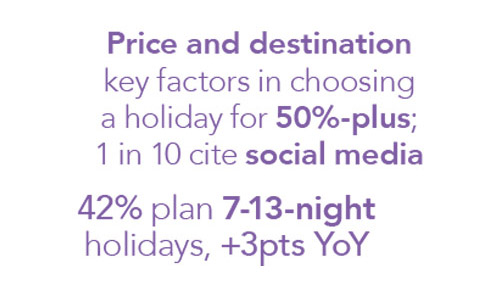The UK travel sector entered 2026 against a backdrop of subdued global economic growth and persistent uncertainty. Corporate strategies remain largely defensive, with cost reduction still a priority, although there are early signs of a shift towards cautious optimism.
Consumer confidence also remains fragile as households are wary about job security and the broader economic outlook. Despite wage growth set to continue to outpace inflation, driving improvement in disposable incomes, political, economic and geopolitical risks continue to suppress a broad‑based recovery in consumer spending.
Given the context, the travel industry has shown remarkable resilience and is expected to experience robust demand heading into 2026. Global leisure travel intentions for the start of 2026 remain strong, according to the latest Deloitte Consumer Signals research, with nearly all major categories seeing slight improvements compared with the same period a year ago. Net spending intent has strengthened across the sector, particularly around airlines, with more travellers planning to spend more on full‑service carriers, convenient itineraries and seat upgrades.

Despite the economic headwinds, consumers treat holidays as essential. Outbound volumes and cruise bookings have hit post‑pandemic highs and inbound travel is set to exceed pre‑pandemic levels. Domestic travel has grown more slowly due to cost pressures, while corporate travel has partially recovered but is now more targeted and conscious of cost over emissions
Value, flexibility and unique experiences drive bookings. Revived package holidays, all‑inclusive and premium options, off‑peak travel and niche segments (wellness, active leisure, city breaks) reflect shifting preferences and a desire for more personalisation.
Technology and AI (including agentic and generative models) are accelerating personalisation, revenue management and efficiency, but adoption is uneven because of gaps in data integration and digital foundations.

Ultimately, travel relies heavily on trust for what are high‑value, emotionally significant purchases, so success will come from blending tech with human expertise while simplifying distribution and search.
Sustainability remains a strategic imperative, but the pace of regulatory change has slowed with a shift towards embedding sustainability to support value creation. Progress is focused on areas with clear cost or risk benefits, but Scope‑3 transparency and reporting remains challenging, and physical climate risks make adaptation urgent, although price and convenience often beat green choices for consumers.
Regulatory and geopolitical ambiguity (on Atol, package travel, sustainability and AI rules) can dampen investment and force scenario planning. Market structures are blurring with partnerships across hospitality, food and beverage, wellness and retail. Labour shortages persist, requiring digital and interpersonal reskilling, and cybersecurity risk is rising – making resilience, governance and recovery planning as critical as prevention.

M&A and private equity interest are expected to pick up as macro conditions improve and will favour resilient, tech‑enabled and luxury assets, with rigorous due diligence on AI and sustainability.
So, the UK travel sector faces a complex and dynamic environment. Economic pressures, technological transformation, evolving consumer expectations and regulatory change will shape the year ahead. Success will require agility, investment in people and technology, and relentless focus on value, trust and resilience.
Foreword: Demand for travel undiminished

The outlook for the outbound holiday market appears all but on a par with last year’s record high, says Travel Weekly executive editor Ian Taylor
Consumer research for the 2025 edition of this report suggested a strong, if not a record, year for outbound tourism – which is what last year proved to be.
Similar research for this report suggests a small decline from last year’s high in the proportion of UK adults ‘likely’ or ‘very likely’ to book an overseas holiday in 2026, but this remains at 56% with a corresponding increase in the proportion undecided. One in two prospective holidaymakers expect to spend more this year than last, with a similar proportion ‘more concerned than previously’ about the cost of holidays.

The attraction of all-inclusive accommodation shows no sign of waning, with more than three out of five overseas holidaymakers (62%) saying they are likely to book all-inclusive for their main holiday – a rise of three-percentage points on a year ago. That is 15 points up on 2018 and 20 points on 2015 – a remarkable increase in demand and a mark of how attractive the combination of a premium resort with costs covered upfront has become.
The post-pandemic surge in inflation and the resulting squeeze on household disposable incomes led to successive years in which an increasing proportion of consumers indicated they were likely to reduce the duration of their main overseas holiday. That trend appears to have plateaued, with a rise of three percentage points to 42% in the proportion planning a holiday of seven to 13 nights.
The price of peak-season holidays, highlighted a year ago, remains a concern. Three out of five likely holidaymakers, and one in every two parents with children, plan to travel outside peak season.

Strikingly, the research suggests most holidaymakers expect to pay taxes at their hotel or in resort in addition to the price of their holiday – despite the Competition and Markets Authority looking to enforce new rules on travel sellers to include all such taxes and charges levied in resort in prices shown to customers. We may see the first cases of CMA enforcement of the new rules soon after this report appears.
Alongside continuing strong intent to travel and concerns about cost, the research suggests an increased awareness of the impact of tourism on destinations. This rates as the leading sustainability-related concern among respondents for the first time alongside the extent to which local people benefit. No doubt this is in response to continuing protests against ‘overtourism’ and the shortage of homes in some of the most-popular destinations.
The transformation of border processes will see the UK enforce its Electronic Travel Authorisation (ETA) system (and a £16 fee, soon to rise to £20) from February, while rollout of the EU Entry/Exit System (EES) is due to be completed by April. We must expect some delays.

The great unknown element is what impact the heightened political volatility and tensions around the world will have. Much of the certainty of recent decades in international affairs has gone. Multiple assumptions can no longer be made. The only certainty appears to be increasing volatility.
I am indebted to Deloitte and its contributors for their considerable insight and time.
REPORT PARTNER

Deloitte is an industry leader in the travel and aviation sector.
The team works across the globe on complex, major programmes and projects for some of the industry’s largest companies. Our dedicated team offers a range of integrated services ranging from audit and tax advice to more specialised advisory, corporate finance, strategy, technology and operations excellence, blending deep industry knowledge with core methods and techniques.
Our team provides insight and understanding of the challenges of today’s environment and the ever‑changing travel and aviation landscape. We work with most of the world’s leading companies and provide an outstanding service – with a focus on maximising value for our clients and enabling them to make informed decisions.
If you would like to discuss any of the topics in this report, or our services, please contact one of our travel and aviation specialists:
| Alistair Pritchard | lead partner, Travel, Cruise and Aviation | ajpritchard@deloitte.co.uk |
| Debo Debapratim | director, senior economist | dde@deloitte.co.uk |
| Andy Gauld | partner, Head of Aviation | agauld@deloitte.co.uk |
| Andrew Ward | lead partner, Hospitality | anward@deloitte.co.uk |
| Tim Robinson | director, Audit and Assurance | timrobinson@deloitte.co.uk |
| Gillian Simpson | partner, Retail | lgolding@deloitte.co.uk |
| Lee Simpson | partner, Digital Government, Identity and Borders | leesimpson@deloitte.co.uk |
| Oliver Graves | director, Human Capital | ograves@deloitte.co.uk |
| Peter Gooch | partner, Cyber Risk Services | pgooch@deloitte.co.uk |
| Ellena Ronca-Thompson | partner, Engineering, AI & Data | eroncathompson@deloitte.co.uk |
| Ed Knight | director, Tax | edknight@deloitte.co.uk |
| Luke Golding | director, Legal | lgolding@deloitte.co.uk |
| Shonal Tankaria | director, Transaction Services | stankaria@deloitte.co.uk |
| Anika Keys | director, Transaction Services | akeys@deloitte.co.uk |
| Simon Brennan | director, EMEA sustainability regulation hub lead | simbrennan@deloitte.co.uk |
| Bethany Hawkings | assistant director, ESG and Sustainability | bhawkings@deloitte.co.uk |
| Jon Bolger | senior manager, Head of Business Travel | jbbolger@deloitte.co.uk |
| Will McNally | senior manager, Audit and Assurance | wmcnally@deloitte.co.uk |
| Gabriella Cooper | senior manager, Human Capital | gabriellacooper@deloitte.co.uk |
| Amy Pickett | senior manager, Audit and Assurance | amypickett@deloitte.co.uk |
| Dr Bryn Walton | senior manager, Insight, Consumer Industry | bcwalton@deloitte.co.uk |
| Céline Fenech | senior manager, Insight, Consumer industry | cfenech@deloitte.co.uk |
To find out more, visit the Transportation, Hospitality & Services section of the Deloitte website






